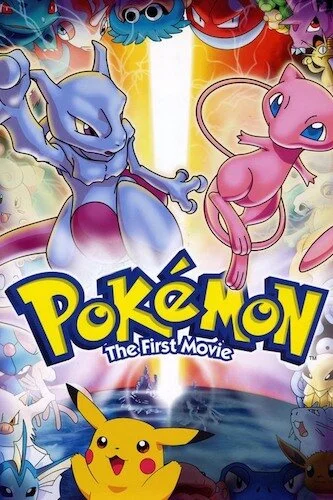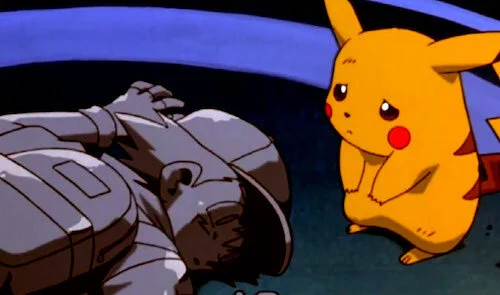Pokémon The First Movie: Mewtwo Strikes Back
Today is the anniversary of the founding of Nintendo. So, here’s a review of Pokémon The First Movie: Mewtwo Strikes Back.
I adore Pokémon. It is a video game franchise I have held onto since I was a child, and continue to play still to this day (ask my all-shiny team that kicked the champion’s butt in Pokémon Sword). What I have grown out of though is the anime television show, where it’s taken Ash Ketchum decades to finally become the champion (which, hey, we all operate at our own pace bud), many of the game’s rules are broken, and dad puns are shoved into the script to the point of explosion. I know the show is it’s own entity that is separate from the games, but that’s precisely why I don’t feel attached to it. Regardless, I did love the show as a child, and that led up to the complete excitement I had for The First Movie: Mewtwo Strikes Back. Seeing the man made clone Mewtwo battle with his source Mew (the latter being a pokémon that many kids, like myself, were itching to be able to own in the games, trying to find them underneath abandoned trucks on islands) was all I wanted.
Except it was borderline asinine.
Now, before I continue, I must preface that I am reviewing the English language, American version of this film. I’m fully aware that a lot of content got taken out of Japanese films and shows with crossover appeal when they made their way over here in the ‘90s, as forms of censorship or cultural significance (appeasing to Americans or English speakers, if you will). I can’t say how good or bad the actual original film is. All I can verify is that Mewtwo Strikes Back is full of hypocrisy, aimlessness, and pandering. In the games, the topic of battling creatures is always a bit of a tightrope walk, with bad trainers forcing their pokémon to fight out of hunger for power, and good trainers fighting to be the best (huh…).
However, in this film, Mewtwo’s army battles their hosts, perhaps as a statement on how it feels to be cloned from a living being and stripped free of will. That’s all well and good, but the original pokémon are used to fight as well. I know there’s some sort of Blade Runner replicant argument here that’s really good, and maybe it’s in the Japanese version. However, it’s not here, and instead we have a dude angry about being bred for battle and complaining to those that breed or own pokémon for battle. Maybe it’s him feeling bereft of love. If that’s the case, the film doesn’t explore that enough.
I’m not putting a snarky comment to this picture, because I don’t want to be stabbed.
After all of that, Mewtwo brainwashes everyone that takes part in this massive battle between pokémon — trainers included — so no one even remembers the morals we were all supposed to learn here today. Dare I ask why? The film gives some bogus reason, but I don’t buy it. If this is about freedom of choice, why bother telling us anything? Then there’s the stuff that just goes against the video game lore, which I know is unattached from the games, but they make absolutely no sense in this film either. Tears can’t cure petrified statues, neither in the games, real life, or in the context of this series (I can’t recall anything like this happening in at least the first few seasons of the show, but please don’t hesitate to correct me, fans). Even if this did happen, it’s just the cheesiest resolution for a film that feels much more invested in feelings than in story telling.
Considering the Frankenstein origins of Mewtwo and his betrayal of his creator, I feel there is something much more poignant and inspiring to be told here. We don’t get it. Even if we did, Mewtwo negates all of it for some reason. It’s simply ludicrous. The only positivity I can leave is that Mewtwo Strikes Back is a love letter to super fans of the game. Aside from that, I can take off my pokémon trainer’s hat, and my nostalgic goggles, and see the begging for money from fans’ pockets that the film actually is. Okay, so the artwork of the animation is crisp, representative of the show but even better (any of the cut corners aren’t present here), and the vibe of the chemistry amongst characters is all here. We do get the occasional moment that works for a minute (Mewtwo taking a step back to witness what he has done) that only gets squashed by something insipid shortly afterwards. In short, Mewtwo Strikes Back only works for big fans; even then, does it work for all of them?
Don’t even get me started on that CGI remake of the film that changes basically nothing. Why bother?
Andreas Babiolakis has a Masters degree in Film and Photography Preservation and Collections Management from Ryerson University, as well as a Bachelors degree in Cinema Studies from York University. His favourite times of year are the Criterion Collection flash sales and the annual Toronto International Film Festival.






